ESPN Vs. Charter Could Be The End Of The Cable Bundle...And Televised Sports As We Know It |Clay Travis
In the summer of 2014, the cable and satellite bundle peaked. One hundred million households were subscribed to ESPN, the most successful channel in the history of cable, and the apex of the greatest business in the history of media had been reached.
But no one knew it.
Cable, satellite, and media executives were all blissfully unaware of what was coming. Fox Sports FS1 had launched the prior year -- yours truly appeared on the very first show in the history of the network, a 2013 college football preview show. In the summer of 2014 the SEC Network would make its debut. The SEC Network was, in fact, the single most successful cable and satellite channel debut in the history of the cable industry. With the launch of the SEC Network, ESPN, the channel's owner, stood at the pinnacle of its power, the company seemed indestructible, a gold plated money minting machine.
Billions of dollars in profits flowed off ESPN each year, enabling all of Disney to flourish. It was the crown jewel of the company, a profit spigot, the Titanic of the cable fleet.
But an iceberg loomed ahead.
And almost no one saw it coming.
The era of cable and satellite cord cutting began in the fall of 2014.
Quietly, at first.
So quietly, in fact, that most at ESPN and in the cable industry refused to acknowledge what was occurring. A few million here, a few million there, slowly a trickle turning into a stream and then the stream turning into a river and before long there was a flood of cord cutters.
If they made a movie about the cord cutting disaster -- and at some point they might -- a quant would be the hero. Someone deep in the recesses of ESPN's business department who looked at the cable revenue spigot and started to realize what was going on -- the greatest business in the history of media was sputtering, just as ESPN spent greater and greater sums of money on sports rights. That person probably jumped and waved their arms, begged ESPN executives not to keep spending money on sports rights like drunken sailors.
And that person was summarily ignored.
Cord Cutting Has Massive Effect On ESPN
By the summer of 2023, just nine years after peak cable was hit in 2014, only 70 million households were paying for cable or satellite subscriptions. ESPN had lost 30% of its business, just as the cost for sports rights loomed larger and larger.
And then last week, inexplicably, things got worse. Charter Communications, home to 15 million cable and satellite subscribers, refused to bend the knee to ESPN's price increase demands and cut the channel -- along with ABC and all other Disney properties -- off air just as Florida prepared to kick off against Utah on the opening Thursday night of college football.
And the games remained off air all throughout Week Zero and into the first full weekend of college football.
Now, the NFL season looms for ESPN, the Jets against the Bills, Aaron Rodgers vs. Josh Allen on Monday Night Football and still there's no resolution in sight.
How did ESPN's business die?
Gradually and then all at once.
Nine years ago ESPN was in 100 million households, without Charter they are in around 55 million households. In the space of nine years, ESPN has lost almost half its audience, half its business, half its subscription revenue.
This is a massive media story, one of the biggest of our lives. And it's not just ESPN. ESPN just stands to lose the most because it had the most lucrative business model in cable. It’s all of the cable and satellite bundle, the entire cable neighborhood is on fire.
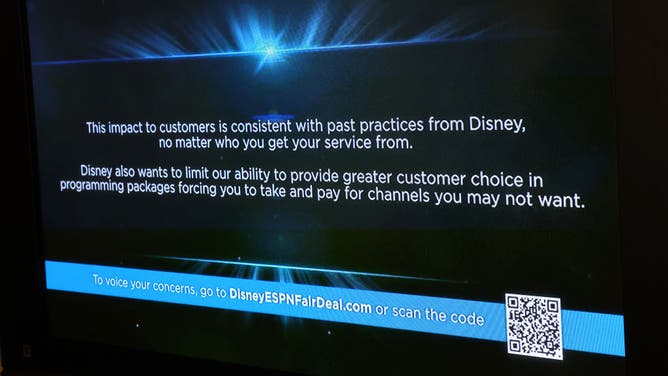
ESPN was largely unavailable to cable and satellite subscribers as college football kicked off. (Photo Illustration by Mario Tama/Getty Images).
As much as you've read about this ESPN-Charter battle so far? It should be ten times that much. Because this is how the free ride that most of us sports fans have grown used to comes to a screeching halt. This is bad, very bad, if you're a sports fan, a sports media employee, a sports executive or an employee of a sports team, this is asteroid hitting the planet bad, a dinosaur level extinction event.
Whether you're a star athlete, an owner, or just a fan, if you care who wins games or simply enjoy watching those games, we're all about to have to pay a ton more for that privilege.
Put simply, everyone is fucked.
Including, potentially, everyone in all of media, not just those of us in sports media.
Because the golden cable cash spigot has suddenly run out of coins and if sports collapses, the entire cable bundle may collapse with it.
How do we begin to figure out what comes next?
Well, we first have to start at the beginning, when ESPN was founded in 1979 in Bristol, Connecticut. Few knew it then, but ESPN was destined to become the greatest cash producing business in the history of media.
Some people think of me as anti-ESPN, but that's not accurate. I used to be one of the biggest ESPN fans on the planet. Because I did and still do love sports to an unhealthy degree. Before Keith Olbermann decided men should become women's sports champions, he, alongside Dan Patrick, were the best tag team of sports anchors in my life. Every morning as I got ready for school I would sit on the couch in my Nashville, Tennessee home and watch SportsCenter as I shoveled cereal in my mouth. If you'd told me in 1993 that at some point Keith Olbermann or Dan Patrick would have ever known my name, I would have walked on air for a week, a month even.
Because when I was fourteen years old, I was convinced that Dan Patrick and Keith Olbermann were two of the coolest dudes on the planet.
And it wasn't just that duo. Chris Berman, Tom Jackson, Linda Cohn, Stuart Scott, these ESPN anchors were all legends in my mind.
Because I was old enough to remember an era when our family didn't have cable. When you got a couple of minutes of crappy local sports highlights, when you had to get the newspapers and, oh no!, your team was on the west coast and you'd have to go the entire day waiting to see if they won or not. Hell, I listened to games on the radio. And not because I happened to be in the car on a long ride while a game was going on, because that was the only way I knew to hear a game live. There was no option to watch it on TV, not even on pay-per-view.
If you haven't ever found yourself squinting at the bottom of the TV screen to see the score ticker go by on CNN Headline News or ESPN, you really have no idea what I'm talking about.
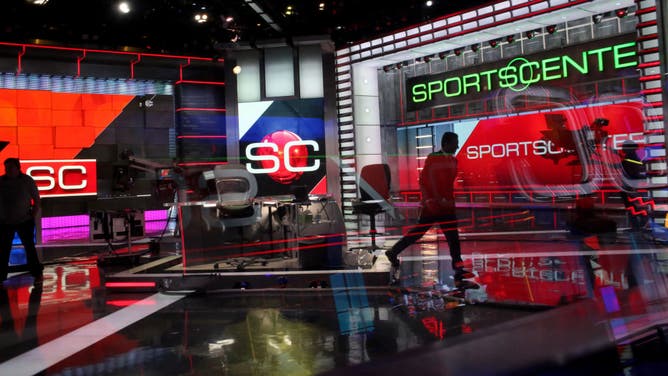
SportsCenter was part of my morning routine growing up. Now, Sportscenter and ESPN have lost tens of millions of subscribers. (Photo by Yana Paskova/For The Washington Post via Getty Images).
But for sports fans, ESPN in those days was the oasis in a media desert, our salvation, nirvana for the sports fan soul.
I didn't understand ESPN's business back in those days, but I understood the raw concept of supply and demand. ESPN was selling what I wanted. And chances are it was selling what you wanted too. And what did we want? The games. (And the highlights, at least back then).
ESPN Has Been A Cash Cow
Over the decades, ESPN ran a game plan that allowed it to become the most lucrative media company in American history. They used our cable and satellite subscription fees -- our cable bill -- to buy up sports rights and as their cable and satellite subscription revenue grew they bought better and better sports rights. And when the cable and satellite companies balked at paying ESPN more, what did they do? They got fans to threaten to leave the cable and satellite companies so that the cable and satellite companies always buckled and ended up paying more.
We were the addicts and ESPN had the games that sated our need.
It was a hell of a business, like I said, the best business in the history of American media.
By the fall of 2014, ESPN was making around $6 a month per subscriber, at $6 a month x 100 million subscribers that means ESPN was making around $7 billion a year. Toss in another couple of billion in advertising and we're talking about a $9 billion, roughly, revenue enterprise.
A quick refresher for those of you who don't understand the cable and satellite business -- every channel has a cost per month. So while you might pay $100 a month for a cable or satellite subscription, each channel costs a different amount. Some channels cost a quarter a month, others a dollar, ESPN was far and away the most expensive channel, costing several dollars a month for every single cable and satellite subscriber, all 100 million of us at the peak in 2014. And ESPN used all the money they made off cable and satellite subscriptions to buy up sports rights. The better the sports rights, the more they could charge, it was a phenomenal business, a fly wheel of cash.
Presently, ESPN spends roughly nine billion a year on sports rights. The company has committed, and this is before they have to pony up for new rights for the NBA and new rights for the college football playoff, $45 billion in sports rights fees through 2027. $45 billion! With tens of billions more still to come for the NBA and college football, ESPN wants to keep both.
The biggest and most expensive rights packages presently? That's the college football playoff and the NFL's Monday Night Football package, each of which airs exclusively on ESPN's cable channel. ESPN pays $2.7 billion per year for Monday Night Football, a gargantuan sum of money for less than twenty games a year. That’s well over $100 million per NFL game.
But the flaw in the business, and all businesses have flaws, was this -- most people paying for ESPN, that is, most of the 100 million subscribers in 2014, weren't actually sports fans. Yet they still paid $100 a year for ESPN. Your Aunt Gladys, who hadn't watched a sporting event in decades, paid the same every month for ESPN as you did. Only she didn't know. Because your cable bill was never itemized. You knew what HBO cost a month, because it was extra, a premium channel -- and your mom and dad, like my mom and dad, may well have refused to pay extra for it, leaving you gorging on the free previews back in the day -- but you never knew what ESPN or TBS or TNT or AMC or CNN or Fox News cost because the cable cost wasn’t itemized by channel, it was buried in your cable and satellite bundle, in your monthly bill.
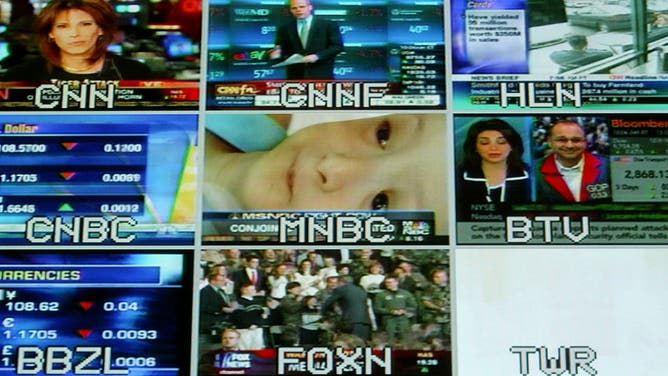
All TV/streaming networks have different prices, though you won't see them itemized on your cable bill. (Photo by Chris Hondros/Getty Images)/
Now let's pause for a moment and go back in time to 2014, when the cable and satellite bundle peaked.
Do you know what else happened in 2014 in the world of media?
"House of Cards" season two debuted on Netflix.
Do you remember "House of Cards?” Kevin Spacey played a diabolical South Carolina politician hellbent on the pursuit of power. It was a great show, but it was also an incredible gamble, because it was the first ever Netflix original show. Up to that point, Netflix had made all of its money by buying up everyone else's reruns and bundling them in its streaming service. I still remember how stunned I was, as I sat bleary eyed up in front of my family's first flat screen TV, and watched each “House of Cards,” episode keep playing, one after the other unless I stopped each new episode, the weekly scheduled show was no more, Netflix released entire seasons all at once.
Let's consider the stature of two media companies back in 2014 when “House of Cards” season two debuted -- Disney, ESPN's parent company, and Netflix, which just released season two of its first ever original series, were widely divergent in their power.
Disney stock traded at $84 a share when season two of Netflix debuted in 2014. Netflix, meanwhile, traded at $57 a share. Their market caps were wildly different, but let's fast forward to today, Netflix is presently $445 a share. That means in the past nine years, your initial Netflix stock purchase has increased by roughly 8x. Meanwhile, Disney is currently $81 a share, a LOWER price than it was nine years ago.
Netflix, which was a $25 billion market cap stock in 2014 is now worth just shy of $200 billion and Disney is a $148 billion market cap stock, roughly the same as it was in 2014.
How did this happen?
Streaming.
It turns out "House of Cards," star Frank Underwood's biggest kill wasn't on screen at all, it was in the media business.
Netflix, which soon had many competitors in the streaming space, destroyed the cable and satellite bundle.
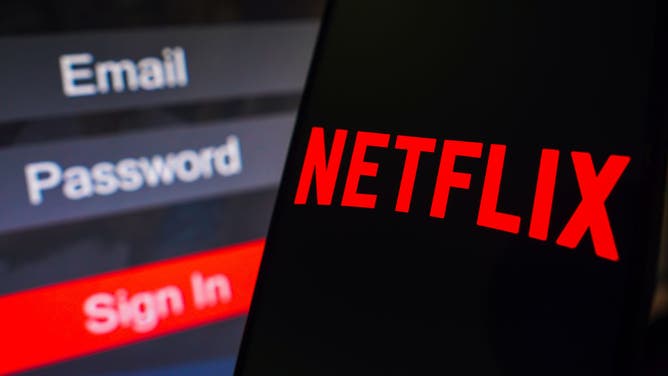
Netflix changed the game and streaming services are more popular than ever. (Photo Illustration by Rafael Henrique/SOPA Images/LightRocket via Getty Images).
In 2014, I paid for one streaming service, Netflix. Now, and I shudder to even lay all these out, the Travis household is subscribed to what feels like every streaming service on the planet. And we still have cable too, you’re welcome, Comcast. The Travis household is subscribed to Amazon Prime -- I think we actually have two of these accounts because I lost our password and it was either get divorced or just have my wife sign up a new account because I couldn't track down the old password -- Netflix, Disney+, Hulu, ESPN+, Peacock, Apple+, Paramount, I still think we pay for the WWE Network somehow, basically if you have created a streaming service we pay for it.
Disney made tens of billions on the cable and satellite bundle. Do you know what Disney has made off streaming so far? They've lost $11 billion.
Let me repeat that, they've lost $11 billion. I'm not a math genius, but when you have to make $11 billion to get back to zero, that doesn't seem like a great business to be in.
And the same is true for every American company that has entered streaming except for Netflix.
All of them have lost money, every single one. Netflix is the only American content company to make money off streaming so far.
Why is that?
Because Netflix's only business is streaming.
Netflix Remains Dominant While Others Struggle
Every other one of these big media companies, except for Apple and Amazon, which are using streaming as ancillary offerings for their primary businesses, has cut their own cable and satellite throat by creating a streaming service because they were afraid Netflix would have the streaming industry to themselves.
The cable and satellite industry was the best business in world media history. And all of these big media companies destroyed that business by going all-in on streaming, which so far is the worst business in world media history.
Okay, you might be thinking, how does this impact sports and the ESPN/Charter battle?
Well, you know the broadband wires in your house that you probably forgot are there -- it turns out that's actually a way better business for the cable and satellite companies than the cable and satellite business is.
We're all addicted to the Internet.
And we can't get on the Internet without those broadband cables (at least most of us can't). And that business is a way better business now than cable and satellite.
Charter has been in the cable and satellite business for a long time. But they have smart business guys too and those smart business guys are seeing all of you drop cable and satellite bundles and they see that the long range cable business is not going to be particularly profitable. What's more, even if they don't have smart quant guys they can see what Disney is telling everyone about ESPN because Disney CEO Bob Iger keeps telling everyone his plans for ESPN
And that plan is this, succinctly, "We're going to take ESPN directly to consumers as a streaming service eventually, but not yet. First we're going to bleed the cable and satellite companies for as much money as we can."
In the meantime ESPN+ is just an attempt to monetize all the content that isn't good enough to be on regular ESPN, ESPN2, ESPNU, the SEC Network, you get my drift. ESPN+ is just a test case for the future when all of ESPN will be streamed direct to the consumer.
But ESPN got cocky -- they went and told everyone that eventually ESPN would put all its games on a direct to consumer streaming company. And then they wouldn't need the cable and satellite companies at all to bring their channel to the masses.
But, in the meantime, ESPN expected the cable and satellite companies to keep paying them full freight. But that wasn’t all, ESPN expected they could keep raising prices too. Effectively ESPN told the cable and satellite companies that it was going to cut their arms and legs off, but it wasn't sure when it would decide to do so. Still, ESPN expected for the cable companies to sharpen the sword for them.
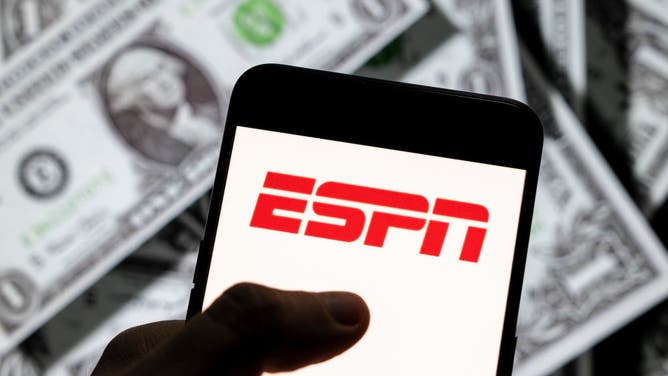
ESPN continues to raise prices and now, there is finally pushback. (Photo Illustration by Chukrut Budrul/SOPA Images/LightRocket via Getty Images).
And most cable and satellite companies didn't fight back that hard because they also have exposure to the cable and satellite bundle. Comcast, for instance, doesn't want to lose ESPN because if they do then all the NBC cable properties will lose a ton of money due to the cord cutting. So they may not like their ESPN deals, but they can at least convince themselves that they are making a ton of money by milking the cable and satellite bundle dry too.
But the Charter guys, who don’t own cable channels like Comcast, look at the math and think, "We don't really care about the cable and satellite bundle because we make most of our money off broadband." So unlike virtually every other carriage dispute we've seen, when ESPN’s games being pulled made fans furious and the resulting threats terrified the cable companies, the Charter people are actually encouraging you to go sign up for YouTube TV or whatever other streaming service you want to use. Why? Because they make more money off broadband, they don't really care about their cable business any more.
And they know that ESPN wants to cut their arms and legs off, but they're calling ESPN's bluff here because for the first time ever, ESPN's got less leverage than the cable company does. ESPN needs cable more than cable needs ESPN.
So ESPN is fucked.
And so, maybe, is the entire cable and satellite bundle.
Because Charter knows that if ESPN goes direct to consumer, guess what, THEY STILL MAKE MONEY!
Because you have to stream ESPN on their broadband service and they take a share of the sign up money to bring ESPN to the home too.
Trouble Is On The Horizon
And ESPN knows that their cable and satellite business is collapsing but, and this is key, they've also done the math and realize that streaming is going to destroy their existing cable business. Because, and this is what no one seems willing to say, ESPN doesn't just have one bad business now -- the cable and satellite bundle -- they have the streaming business too, which is an even worse business. And, and this is very key, each business is accelerating the demise of the other. Streaming isn't making ESPN stronger, it's making ESPN weaker because it's hastening the destruction of a profitable business -- cable and satellite -- for a money-losing business -- streaming.
And that's what many are still missing -- as the cable and satellite bundle boat takes on water and sinks, the streaming bundle is also taking on water and sinking too. ESPN has tried to sell people on the idea that at the exact moment that the cable and satellite bundle collapses they are going to step to a brand new business, the streaming business, and it's going to be a sturdy and successful lifeboat that carries them to richer waters.
But the reality is, streaming is a way worse business than the cable and satellite bundle. Because the only people who pay for ESPN will be sports fans. The free ride is over, your Aunt Gladys is never signing up and subsidizing your sports viewing again.
For the record, I'm not great at math. The only math class I ever took in college was - and I'm not making this up - something called, "Mathematical Concepts," It was me and every sorority girl at George Washington University.
So it was the greatest class of my life.
Anyway, let me help you here with my rudimentary math ability. Let's say ESPN makes $8 billion a year now in subscription fees. ($10 a month x 70 million subscribers they has before Charter cut this by 15 million). Toss in another two billion in advertising and let's say ESPN presently nets around $10 billion a year. Okay, how many people will sign up for ESPN as a direct to consumer streaming service? If they could get 70 million subscribers we'd all have to pay $120 a year for ESPN streaming by itself. (This assumes advertising will still be the same, which it won't, but let's just be generous and pretend it will.) But, as I noted above, many of these people paying for ESPN now as part of their cable and satellite package never watch ESPN.
So how many people will actually subscribe to a direct to consumer ESPN streaming service? Turns out there are some early test cases.
The NFL Sunday Ticket is the most desirable direct to consumer product on the planet. Do you know how many households subscribe for NFL Sunday Ticket? Around three million.
Uh oh.
Wait a minute, you're telling me that the NFL can only get around three million households to sign up for actual NFL games, all of the out of market games, in the entire country?
We've got a major math problem here for ESPN.
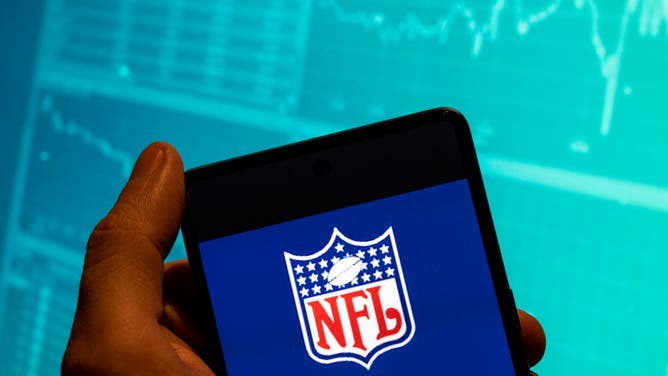
If fans aren't paying to watch the NFL, why would anyone believe they'll pay to watch other sports? (Photo Illustration by Budrul Chukrut/SOPA Images/LightRocket via Getty Images).
Let's be generous again and say that ESPN can get 7x as many subscribers as the NFL can for Monday Night Football and college football. That's 20 million, roughly, subscribers. What would those 20 million people have to pay for ESPN over streaming to replicate what ESPN makes now? $500 a year. That's roughly $40 a month.
And that's if everyone pays that amount all year around.
Which they won't.
Not even close.
Because here's the other problem -- most people will pay seasonally for the sports they actually care about the most.
Many ESPN streaming subscribers will pick the months they care about the most -- football season -- and cancel for non-football season. Especially when the service costs this much a month. (Most ESPN+ subscribers aren't paying for the service now or its bundled for free alongside other products so ESPN+ isn’t a good test case.) Churn is a major issue on streaming, which is why there has to be constantly new offerings. And even with this constant flow of new content lots of people cut their subscriptions, return and binge, and then cut their subscriptions again. And this doesn't even consider the amount of shared passwords ESPN will have for games, that will be a huge mess.
As if this math weren’t bad enough, remember that ESPN has $45 billion already in sunk sports costs. They bought like the cable bundle was going to last forever. And they still have to buy forever in the future. The NBA and college football playoffs which both expire soon are going to cost tens of billions more. It’s likely ESPN is going to end up with $100 billion in total sports rights costs before long.
And what happens if they don’t buy these rights? No one signs up. So ESPN is locked into a bad streaming business that keeps getting worse.
That’s why Charter has essentially called ESPN's bluff. They're telling ESPN to go ahead and launch their direct to consumer streaming service because Charter thinks they'll make more money on this than they do on cable. But ESPN knows the streaming math doesn't add up. And I'm honestly not sure what the long range plan here is for ESPN. Because the math, I don't think, ever adds up. And this is why I think ESPN is trying desperately to find a buyer for the network. Because the ultimate flaw of ESPN's business is now revealing itself.
And it's this -- ESPN doesn't actually produce anything of value, it just rents the games from the leagues.
ESPN is the sports version of Blockbuster Video. You remember Blockbuster, right? They didn’t produce anything, they just carried the movies you came to rent. And Netflix destroyed them too.
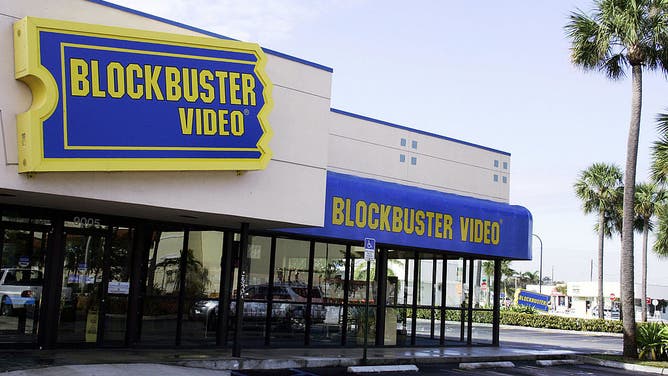
ESPN is the sports version of Blockbuster. (Photo credit ROBERT SULLIVAN/AFP via Getty Images).
ESPN, truth be told, has never fit what works for Disney. Because Disney, whatever you think about the company, is in the production of content it owns forever business. The Marvel movies, Star Wars, Pixar, the animated films, the amusement parks, Disney is in the business of creating content that will last for generations. Notwithstanding the looming disaster that is the new woke, live action version of "Snow White," your kids and grandkids will probably watch these old animated movies and enjoy them just like you did. Same with Star Wars and the Marvel movies. Your grandkids will know who Darth Vader is.
But a Thursday night college football game or an NBA game on Christmas that's played this year?
It's all disposable content immediately replaced by the next rented games on the network.
None of it has any lasting value.
That's bad for Disney, but ESPN is worse than Blockbuster Video because when Blockbuster Video collapsed the entire shopping mall didn't go bankrupt with it. The grocery store was still open, the Subway still made sandwiches, the gas station stayed open, a new store probably opened where Blockbuster used to be.
But ESPN's demise threatens to destroy every shop in the neighborhood.
ESPN Won't Be Alone In Defeat
TNT, Turner, AMC, Nickelodeon, you name the channel, all of them are basically being held together by the cable bundle. And ESPN is the most important channel in the cable and satellite bundle, it's the linchpin, the anchor store. ESPN is your neighborhood shopping mall’s anchor tenant — the Macy’s, the Nordstrom, the Dillard’s the JC Penny. When a mall’s anchor tenant leaves the mall is often dead for, the rest of the shopping mall collapses around it. That’s why the best analogy for ESPN isn’t Blockbuster, it’s Sears, a big mall anchor tenant that collapsed and went bankrupt.
(Side note: I actually think CNN, MSNBC, and Fox News will be okay long range because the demand for live news isn't going away, they'll have to just find new ways to distribute their content. Plus, unlike ESPN which has to pay tens of billions for sports rights, the news isn’t licensed, it’s easier to cut costs. But all the non-live cable channels? They're going to vanish into the streaming universe. Shark Week will come to Netflix or the like. They’re all finished.)
Okay, if you've read to this point, you might be thinking, "This feels like it's going to be really bad, Clay."
Uh, yeah, it is, that's why I called it a media extinction level event.
The asteroid is going to hit everyone in media.
In a major way.
This is also why I don’t see why anyone buys ESPN. Unless you desperately need the sports rights ESPN has right now, why wouldn’t the streaming companies, if they really want to get in the sports business, just outbid ESPN for the NBA and the college football playoff and the other rights as they come to market? ESPN’s only real assets are the rights they presently own. So why would you pay ESPN for the rights fees when you could just wait and outbid them for those games as they come to market? The only value ESPN has is if someone has to have these existing sports rights immediately. But if you wait over the next five to ten years those ESPN rights end and the leagues will sell to the highest bidders on the open market.
And the streaming companies deciding to bid is the best case for the sports leagues.
Because unless the streaming companies step up to the plate, athlete salaries and sports team valuations may have peaked. Because, remember, athlete salaries and sports teams valuations have been subsidized by the cable and satellite bundle too. Do you really think NBA players you've never heard of deserve $50 million a year salaries? Of course not. They're getting paid that because of the cable and satellite bundle. The regional sports networks, which fund much of this salary largesse, are already going bankrupt and no one seems to be able to explain what happens next in terms of local sports rights.
But this isn't just sports.
Every cable and satellite channel is in danger of bankruptcy too. As I laid out above, ESPN is the anchor tenant in the cable and satellite bundle mall. The only thing holding our mall together is sports and live news. And sports may have just left the building.
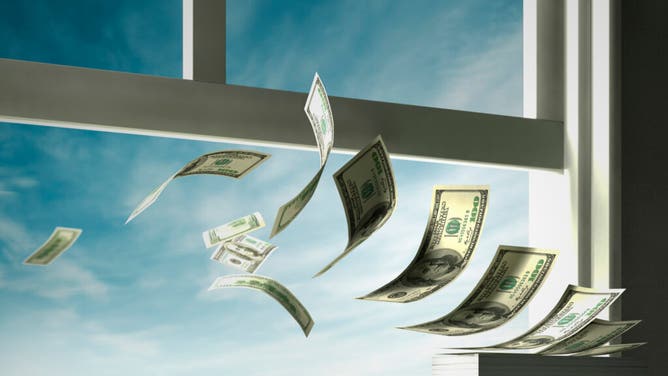
Bankruptcy and loss of significant money looms for cable and satellite services unless we see major changes, quickly. (Photo credit Getty Images).
Now, to be fair, in the time I wrote this maybe Charter and ESPN have come to an agreement and the immediate collapse of the cable and satellite bundle will be forestalled. Maybe this will all happen in three or four years instead of right now.
But it is happening.
It is inevitable. We've basically reached the scene in Avengers where Thanos, the evil villain in the Marvel films, snaps his fingers and half of the population vanishes.
It's like that, except with media companies.
And unlike in the Avengers, no one can travel back in time and reverse the snap. In fact, crazily, with the rush to streaming the cable and satellite companies have been competing to see who can snap first. They’re all Thanos-ing themselves.
Intentionally.
So, yeah, this is bad. Probably way worse than you ever thought it was.
And if you're a sports fans like me and you just want to sit down on your couch and pick up one remote and watch every game with ease, that's never happening again. Watching sports is going to cost you a ton, way more than you ever paid for cable. And some of the games you want to watch are going to be on services that aren't available in your market or aren't at a price point you're willing to pay.
And what's old may become new again.
You might find yourself scanning for games on your radio. You might be hitting refresh on your phone to watch scoreboards, the new digital version of the cable and satellite streaming scores on the bottom of the screen that we grew up with.
And no matter what teams you root for, you're about to pay infinitely more to watch them.
If you can find their games at all.
And as much as you may think ESPN's woke politics suck, things are about to get much worse for every sports fan.
But, again, it’s not just sports, it’s all of cable.
I liked the cable and satellite bundle. You probably did too. And I liked the mall too. I enjoyed going there, getting a pretzel in the food court, buying a new pair of jeans.
I went to my local mall recently, the one I grew up going to, the one I used to have a job in at the local “American Eagle,” but the anchor tenants are all gone.
The parking lot was empty.
Most of the stores were vacant.
The bustle and hubbub was all gone, almost no one was there.
It was a ghost town.
It felt just like one of those zombie shows.
That I used to watch on cable.